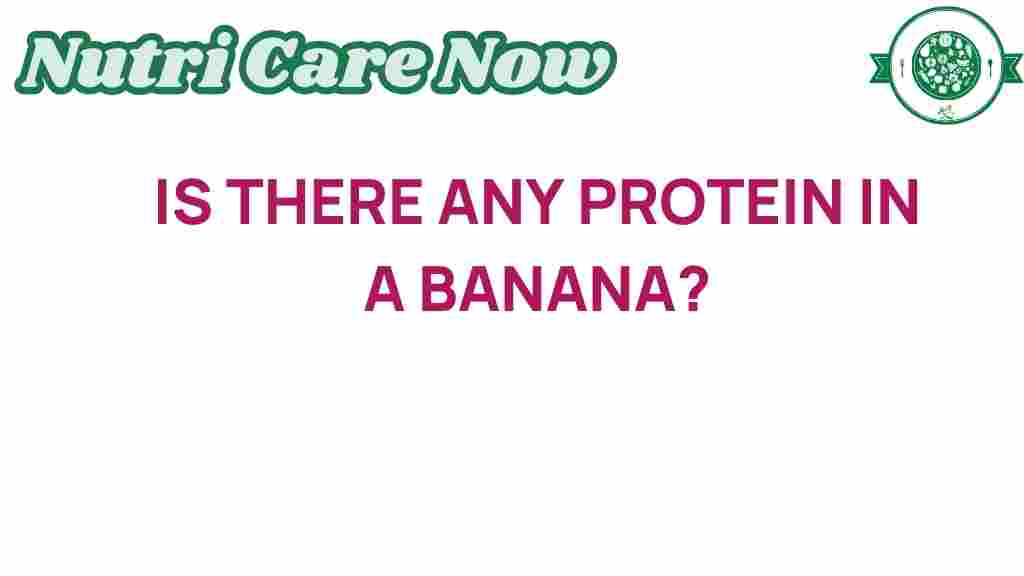Uncovering the Protein Secrets of Bananas: What You Need to Know
When it comes to fruits, bananas often steal the spotlight due to their versatility, convenience, and taste. While many people are aware of their potassium content, few know the secrets hidden within this popular fruit regarding protein in bananas. In this article, we will delve into the health benefits, nutrition facts, and how bananas can fit into your diet as a source of fruit protein, particularly for muscle recovery and overall health. Let’s explore the many reasons why bananas should be a staple in your dietary choices.
The Nutritional Profile of Bananas
Bananas are often celebrated for their rich nutrient content. Here’s a quick overview of their nutritional facts:
- Calories: Approximately 105 calories per medium banana
- Carbohydrates: About 27 grams
- Dietary Fiber: 3 grams
- Protein: 1.3 grams
- Fat: 0.3 grams
- Potassium: 422 mg (approximately 12% of the daily recommended intake)
- Vitamin C: 17% of the daily recommended intake
- Vitamin B6: 20% of the daily recommended intake
While the protein content in bananas may not seem significant at first glance, it plays a crucial role when combined with other protein sources in your diet.
Understanding the Protein in Bananas
Many people overlook the fact that while bananas are not a high-protein food, they do contain some protein and can contribute to your daily intake. The protein in bananas is primarily made up of amino acids, which are the building blocks for muscle repair and overall bodily functions. Here’s how bananas can fit into your protein-rich diet:
- Complementary Protein: Bananas can be paired with protein-rich foods like yogurt, nuts, or protein shakes to enhance your overall protein intake.
- Quick Energy Source: The carbohydrates in bananas provide a quick energy boost, making them an excellent snack before or after a workout.
- Muscle Recovery: The potassium in bananas helps in muscle recovery by preventing cramps and aiding in hydration.
Health Benefits of Bananas
In addition to their protein content, bananas offer numerous health benefits. Here are some key advantages of including bananas in your diet:
- Heart Health: The high potassium content aids in maintaining healthy blood pressure levels.
- Digestive Health: The dietary fiber in bananas promotes healthy digestion and can help prevent constipation.
- Mood Enhancement: Bananas contain tryptophan, which can help improve mood and reduce symptoms of depression.
- Weight Management: Due to their fiber content, bananas can help you feel fuller for longer, aiding in weight control.
Incorporating Bananas into Your Diet
Adding bananas to your diet is simple and versatile. Here are some creative ways to enjoy the fruit protein found in bananas:
1. Smoothies and Shakes
Blend bananas with your favorite protein powder, yogurt, and other fruits for a delicious and nutritious smoothie.
2. Breakfast Bowls
Top oatmeal or yogurt with sliced bananas, nuts, and a drizzle of honey for a balanced breakfast.
3. Baking
Incorporate mashed bananas into baked goods like pancakes, muffins, or breads to add natural sweetness and moisture.
4. Snacks
Enjoy bananas on their own or pair them with nut butter for a satisfying snack that provides both protein and healthy fats.
5. Post-Workout Fuel
Consume a banana after your workout to replenish energy levels and aid in muscle recovery, thanks to its carbohydrate and potassium content.
Protein Comparisons: Bananas vs. Other Fruits
While bananas do contain protein, it’s beneficial to compare their protein content with other fruits:
- Guava: 4.2 grams of protein per cup
- Blackberries: 2 grams of protein per cup
- Oranges: 1.2 grams of protein per medium orange
As you can see, while bananas provide some protein, fruits like guava and blackberries offer more. However, bananas excel in other nutrients such as potassium, making them a valuable addition to your diet.
Common Misconceptions About Bananas
Despite their popularity, several misconceptions about bananas persist:
- Myth: Bananas are fattening. Fact: Bananas are low in calories and can fit into a healthy diet.
- Myth: Bananas are only for athletes. Fact: Bananas can benefit anyone looking to maintain a healthy diet.
- Myth: Bananas should be avoided for weight loss. Fact: Their fiber content can aid in weight management.
Troubleshooting Tips for Including Bananas in Your Diet
If you’re looking to incorporate more bananas into your meals but face challenges, consider these tips:
- Ripeness: Choose bananas that are ripe for maximum sweetness and flavor.
- Storage: Store bananas at room temperature and separate from other fruits to reduce spoilage.
- Freezing: Freeze ripe bananas for smoothies or baking when you have too many to consume fresh.
Conclusion
In conclusion, while the protein in bananas may not be their most notable feature, this fruit plays an essential role in a balanced diet. Packed with potassium and other vital nutrients, bananas offer numerous health benefits, from aiding muscle recovery to promoting digestive health. By incorporating bananas into your meals and snacks, you can enjoy their natural sweetness while enhancing your overall nutrition.
Whether you’re an athlete looking for a quick energy source or someone seeking to improve your dietary choices, bananas are a fantastic option. Embrace the power of this humble fruit and enjoy its many benefits!
For more insights on nutrition and healthy eating, visit this resource or check out our article on healthy snack ideas.
This article is in the category Diet and created by NutriCareNow Team
